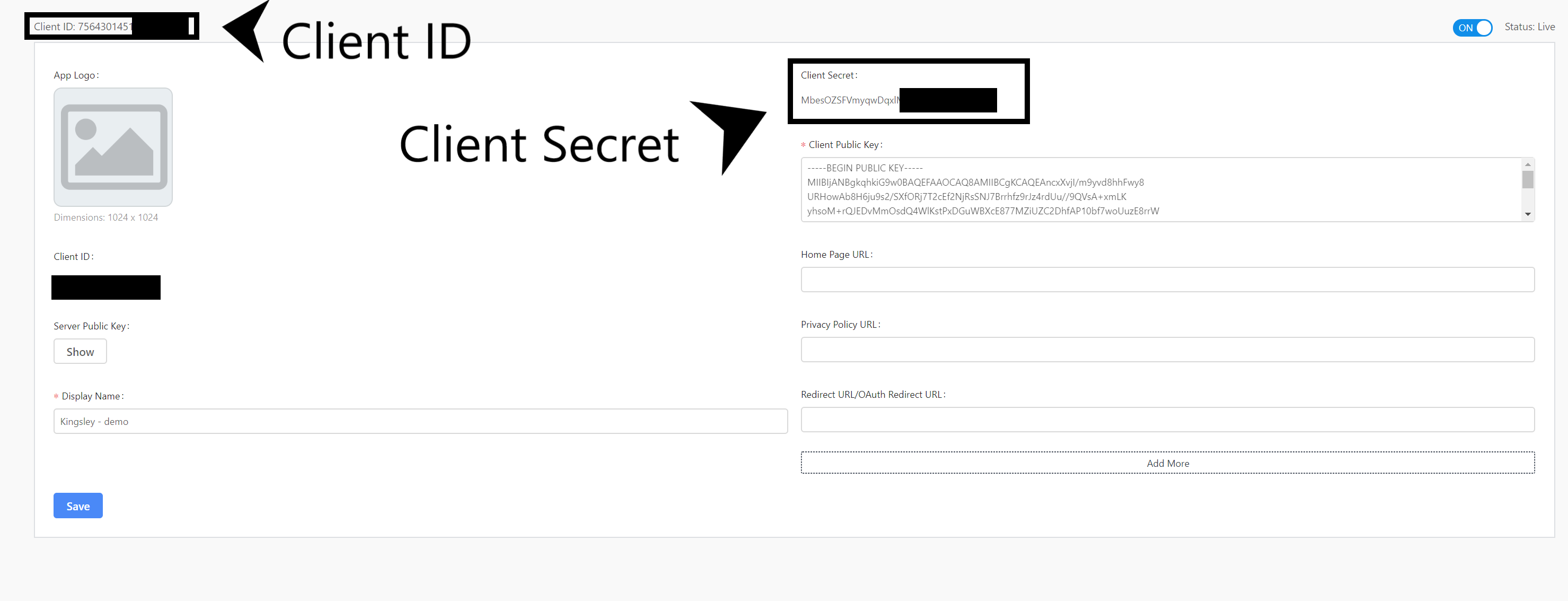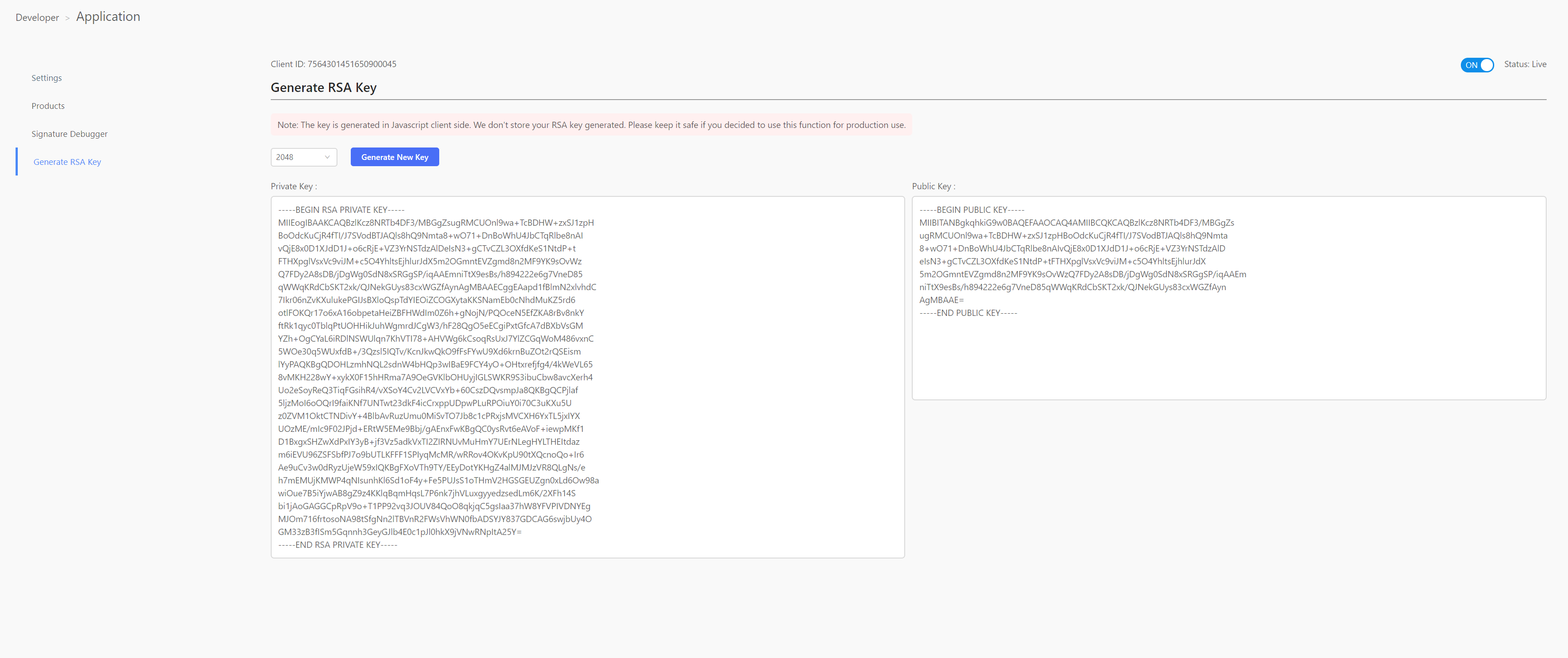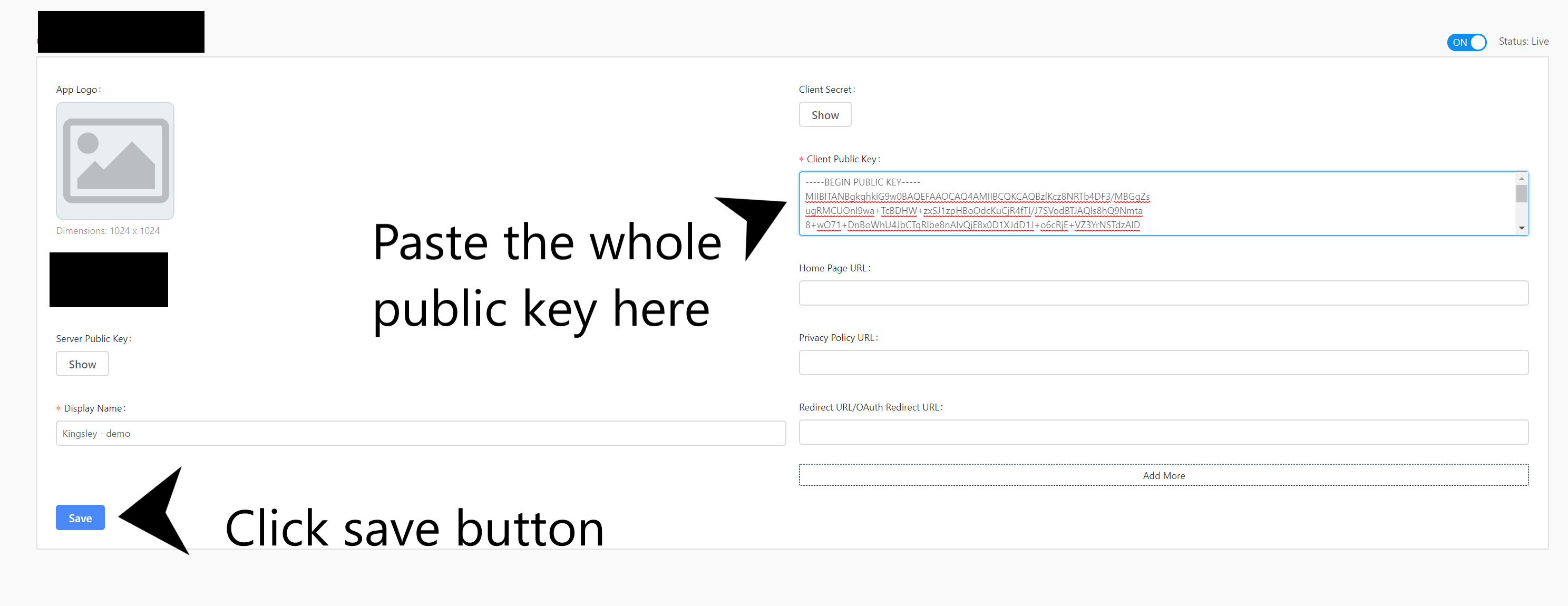This is an Java SDK that maps some of the RESTful methods of Open API that are documented at doc.revenuemonster.my.
These instructions will get you a copy of the project up and running on your local machine for development and testing purposes.
The external library u need to install in order to build this library (Maven):
- com.fasterxml.jackson.core:jackson-databind
- commons-codec:commons-codec
- commons-io:commons-io
- org.bouncycastle:bcpkix-jdk15on
- org.bouncycastle:bcprov-jdk15on
- org.json:json
The Java framework you would need for this project is Java 8 or above
- Maven
<dependency>
<groupId>com.github.revenuemonster</groupId>
<artifactId>RevenueMonsterOpenAPI</artifactId>
<version>1.0.2</version>
</dependency>
- Gradle
implementation 'com.github.revenuemonster:RevenueMonsterOpenAPI:1.0.2'
- Signature Algorithm
- Client Credentials (Authentication)
- Refresh Token (Authentication)
- Get Merchant Profile
- Get Merchant Subscriptions
- Get Stores
- Get Stores By ID
- Create Store
- Update Store
- Delete Store
- Get User Profile
- Payment (Transaction QR) - Create Transaction QRCode/URL
- Payment (Transaction QR) - Get Transaction QRCode/URL
- Payment (Transaction QR) - Get Transaction QRCode/URL By Code
- Payment (Transaction QR) - Get Transactions By Code
- Payment (Quick Pay) - Payment
- Payment (Quick Pay) - Refund
- Payment (Quick Pay) - Reverse
- Payment (Quick Pay) - Get All Payment Transactions
- Payment (Quick Pay) - Get All Payment Transaction By ID
- Payment (Quick Pay) - Get All Payment Transaction By OID
- Payment (Quick Pay) - Daily Settlement Report
- Give Loyalty Point
- Get Loyalty Members
- Get Loyalty Member
- Get Loyalty Member Point History
- Issue Voucher
- Void Voucher
- Get Voucher By Code
- Get Voucher Batches
- Get Voucher Batch By Key
- Send Notification (Merchant)
- Send Notification (Store)
- Send Notification (User)
- "sandbox" is for sandbox environment.
- "production" is for production environment.
- Get Client ID and Client Secret from portal.
- Generate private key and publci key from portal.
- Store private key for own use and public key at portal.
- Set environment variables at begining of the project before using any of the library functions.
Environment environment = new Environment();
environment.setEnvironment(clientId, clientSecret, "sandbox");
- Sample to read private key file
String currentPath = System.getProperty("user.dir") + "/src/privateKey.pem";
String privateKey = getKey(currentPath);
environment.setPrivateKey(privateKey);
private static String getKey(String filename) throws IOException {
//Read key from file
String strKeyPEM = "";
BufferedReader br = new BufferedReader(new FileReader(filename));
String line;
while((line = br.readLine()) != null){
strKeyPEM += line + "\n";
}
br.close();
return strKeyPEM;
}
- Client Credentials (Authentication)
- To get refresh token and access token(expired after 2 hours) with using provided clientId and clientSecret
Authentication authentication = new Authentication();
ClientCredentials clientCredentials = authentication.GetClientCredentials();
environment.setRefreshToken(clientCredentials.refreshToken);
environment.setAccessToken(clientCredentials.accessToken);
- Authorization Code (Authentication)
- To get authorization code which a partner wants to request permission to develop an application of a merchant and exchange authorization code into access token and refresh token
Authentication authentication = new Authentication();
ClientCredentials clientCredentials = authentication.GetAuthorizationCode(authorizationCode,redirectUrl);
environment.setRefreshToken(clientCredentials.refreshToken);
environment.setAccessToken(clientCredentials.accessToken);
- Refresh Token (Authentication)
- To get new access token(expired after 2 hours) with using provided clientId and clientSecret (recommended to schedule to run this fucntion on every less than 2 hours) in order to avoid expired access token error
Authentication authentication = new Authentication();
ClientCredentials clientCredentials = authentication.RefreshToken();
environment.setAccessToken(clientCredentials.accessToken);
- Create Transaction QRCode/URL (TransactionQR)
- To create static/dynamic QR code for user scanning merchant's displayed QR
TreeMap<String,Object> data = new TreeMap<String,Object>();
data.put("amount",100);
data.put("currencyType","MYR");
String[] method = new String[1];
method[0] = "WECHATPAY";
data.put("method",method);
TreeMap<String,Object> expiry = new TreeMap<String,Object>();
expiry.put("type","PERMANENT");
data.put("expiry",expiry);
TreeMap<String,Object> order = new TreeMap<String,Object>();
order.put("details","1 x Coffee");
order.put("title","Sales");
data.put("order",order);
data.put("redirectUrl","https://www.google.com");
data.put("type","DYNAMIC");
data.put("storeId","123412341234");
data.put("isPreFillAmount",true);
Payment payment = new Payment();
TransactionQR result = payment.CreateTransactionQRCodeURL(data);
- Get Transaction QRCode/URL (TransactionQR)
- To get all QR Code(s) generated previously in the system
Payment payment = new Payment();
TransactionQRs result = payment.GetPaymentTransactionQRCodeURL("10","PERMANENT","PERMANENT");
- Get Transaction QRCode/URL By Code (TransactionQR)
- To get specific QR Code generated previously in the system, by passing in code in query parameter (/qrcode/...)
Payment payment = new Payment();
TransactionQR result = payment.GetPaymentTransactionQRCodeURLByCode(code);
- Get Transactions By Code (TransactionQR)
- To get all transactions under existing QR code, by passing in code in query parameter (/qrcode/.../transactions)
Payment payment = new Payment();
Transactions result = payment.GetTransactionsByCode(code);
- Payment (Quick Pay) - Payment
- To make payment by scanning barcode/authcode from user
TreeMap<String,Object> data = new TreeMap<String,Object>();
data.put("authCode","161583080660761280"); //get from user payment barcode
data.put("ipAddress","127.0.0.1");
data.put("storeId","123412341234");
TreeMap<String,Object> order = new TreeMap<String,Object>();
order.put("amount",100);
order.put("currencyType","MYR");
order.put("id","182735122");
order.put("title","title");
order.put("description","desc");
order.put("additionalData","API Test");
data.put("order",order);
Payment payment = new Payment();
TransactionQuickPay result = payment.QuickPay(data);
- Payment (Quick Pay) - Refund
- To refund the successful transactions
TreeMap<String,Object> data = new TreeMap<String,Object>();
data.put("transactionId","181203100634010427614646"); // get from user's transaction
data.put("reason","test");
TreeMap<String,Object> refund = new TreeMap<String,Object>();
refund.put("type","FULL");
refund.put("currencyType","MYR");
refund.put("amount",100);
data.put("refund",refund);
Payment payment = new Payment();
TransactionQuickPay result = payment.Refund(data);
- Payment (Quick Pay) - Reverse
- To reverse time-out or problematic transaction
TreeMap<String,Object> data = new TreeMap<String,Object>();
data.put("orderId","12345678131");
Payment payment = new Payment();
TransactionQuickPay result = payment.Reverse(data);
- Payment (Quick Pay) - Get Payment Transaction By ID
- To get details of a transaction by using transactionId
Payment payment = new Payment();
TransactionQuickPay result = payment.GetPaymentTransactionByID(transactionId);
- Payment (Quick Pay) - Get Payment Transaction By Order ID
- To get details of a transaction by using orderId
Payment payment = new Payment();
TransactionQuickPay result = payment.GetPaymentTransactionByOrderID(orderId);



